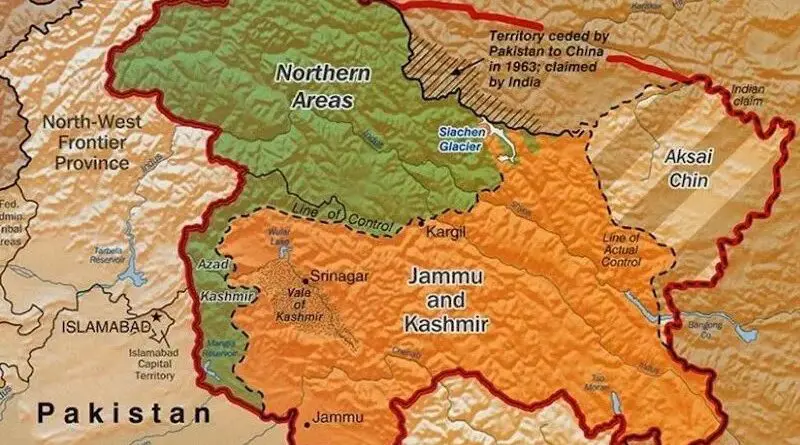Freedom Of Expression Under Threat In Kashmir – OpEd
Freedom of expression is a fundamental human right, which is stated in the Article 19 of the Universal Declaration of Human Rights. Article 19(1)(a) of Indian constitution says that “all citizens have the right to freedom of speech and expression. Freedom of Speech and expression means the right to express one’s own convictions and opinions freely by words of mouth, writing, printing, pictures or any other mode”. But when, it comes to Indian illegally occupied territory of Jammu and Kashmir it labels India’s the suppressor of freedom of expression and opinion. It seems that the freedom of speech in Kashmir no longer exists.
After the abrogation of autonomous status of Jammu and Kashmir on August 5, 2019 by the Modi gov’t, crackdown on independent journalists in Kashmir rapidly increased. Journalists who reported critically against the government policies have faced intimidation, harassment and long investigations. The internet access and freedom of free press or speech remained restricted. The activities of local and foreign journalists had also restricted from the region without official approval, because of fear of coverage which was focusing on the Kashmir conflict and government crackdowns on Kashmiris. The Indian government even continued to disrupt internet service during 2020. Limited mobile and fixed-line service was gradually restored, but high-speed mobile connectivity remained blocked. Police continues its crackdown on free speech. In June 2020, a new media policy was introduced which allows the officials to examine and censor content for “fake news, plagiarism, and unethical or antinational activities.” Many journalists were questioned and charged over their work during the year. There were reports that journalists were being beaten by police and other security force in connection with their work. Former J&K Chief Minister Mehbooba Mufti, said. “People’s thoughts are being monitored and they are punished for it. There is no outlet left to express one’s opinion and this is a deliberate attempt to push Kashmiris to the wall.”
According to local news paper “The Kashmir Walla” Union Territories of J&K and Ladakh, has taken action against its officials for their social media posts. The bank’s management noted that “some employees were seen violating the guidelines and misusing Social Media Platforms, while the bank management issued strict warning against the officials and employees, even they were threatened of job loss.
The Indian government and its security forces always neglect the court orders that bound gov’t to refrain from taking action. In January 2020, the Indian Supreme Court ordered that, the suspension of internet in Kashmir was unjustified and violated constitutional rights to free speech and expression, but authorities were slow to ease the shutdown, and mobile internet access remained restricted till the year end.
In March 2021, Jammu and Kashmir administration has continued its policy of suppressing the fundamental right to speak and express. The administration ordered new employees to submit their social media accounts for police scrutiny. In March 2021 a report published by Freedom House, a US-based non-profit organization, categorized Indian-administered Kashmir as “not free”.
On January 2022, the group of pro-government journalists and police officers forcefully took over the Kashmir press club and stopped the journalist from entering the building. Later it was shutdown by the authorities. The shutdown of Kashmir press club was widely condemned. The Editors Guild of India said it was “aghast at the manner in which the office and the management of Kashmir Press Club was forcibly taken over” and accused the state of being “brazenly complicit in this coup”. Former J&K chief minister Omar Abdulllah, also called it a “state-sponsored coup”. The regional administration declared the Kashmir press club deregistered as a society and the land on which press club stands decide to take back. In January, 2022 Steven Butler, Asia program coordinator of the New York-based Committee to Protect Journalists said “Indian authorities appear determined to prevent journalists from doing their jobs”.
Media has always been tightly controlled in Kashmir Valley. In recent months the harassment and detention of journalists in Kashmir has risen. Government is using its power to compel people to follow the government line, if they do not do so then they are harassed and threatened by the government agencies or even sometime they are booked under the Public Safety Act, a law that allows authorities to arrest or detain people who act against the security of the state. Sajad Gul, a Kashmiri journalist who reported on alleged “fake encounters” by Indian security forces, was detained under the Public Safety Act. Anuradha Bhasin, an editor at Kashmir Times, said “Authorities have created a systematic fear and launched a direct assault on free media. There is complete intolerance of even a single critical word”.
Freedom of expression is considered the fundamental and most essential right of individuals in a democratic, secular and liberal societies, but if we look in Indian occupied J&K under the Modi led Hindutwa rule, its is far away from this fundamental right. The gov’t only focus is, to suppress any voice that put finger against the Modi policies towards Kashmir and its people. The world should take notice of this draconian policies of Modi gov’t in Kashmir which is suppressing people’s from their right to freedom of opinion and expression. Its not only the violation of Article 19, of the Universal Declaration of Human Rights but its also the violation of Article 19(1)(a) of Indian Constitution which says “all citizens have the right to freedom of speech and expression. International organizations and community must take notice of Indian suppression of freedom of expression in the Kashmir Valley and should compel India to must respect the people’s fundament right of freedom of expression and opinion.
The writer is Islamabad based Researcher and Freelancer

